Copywriting is your way of connecting to your consumers and communicating with them in a way that makes them want to pay attention.
The art of writing effective copy requires a considerable level of creativity and innovation to make a resounding impact on the reader.

At the same time, convincing marketing copy also uses certain scientific principles of influence and persuasion that silently work their magic into eliciting a favorable response. Just like a friendly and relatable salesperson at a shop can urge shoppers to pick up the goods, a well-written copy on a website can reel potential consumers in and make them want to buy your products or services.
When a user lands on your website, you do not want them to feel part of a mechanical transaction. You should connect to them in a way that lets them know that you are not a profit-hungry, heartless corporation but a bunch of amenable people with the best interests of the user at heart. You cannot hope to strike up a long-lasting relationship with a consumer without earning their trust and goodwill.
There are several tips and tricks that are frequently endorsed as effective means of making your marketing copy work. In this blog, we shall list the ‘Six Principles of Influence’ that were created by Robert Cialdini; Regents’ Professor Emeritus of Psychology and Marketing at Arizona State University. These principles were published in his 1984 New York Times Business Best Seller book, “Influence: The Psychology of Persuasion”.
Let’s find out what these principles are and how you can incorporate them into your web marketing copy in order to win the heart and trust of people visiting your website.
Principle One: Reciprocity
Imagine a situation in which two of your neighbors need you to walk their dogs. Sadly, the two dogs seem to hate each other and you can only walk one. One of the neighbors is a really helpful guy always ready to let you have some sugar or milk when you run out. The other keeps their blinds put and grunts a grumpy hello every time you pass by. If you are like most people, you’d feel indebted to the helpful neighbor and offer to walk his dog.
This principle of influence is known as reciprocity and you can use it to write effective copy by inducting your site with valuable tidbits of information and insights that are totally free of cost!
Using blogs to make your website more engaging
Blogs with actionable content are a big hit on business websites. Writing blogs that aren’t aimed at frenetic marketing of your products and which actually are of value to the reader is a great way to connect to existing and potential consumers. Hiring a professional blogger for the same can go a long way in creating a lasting impression in the mind of your users. Not only do blogs have an indirect but definite correlation with increased sales but an entertaining and insightful blog can help your business reach hitherto unexplored horizons of popularity on social media.
BirchBox

Birchbox offers style guides for men and women composed of interesting and informational blogs and style know-how. This feature helps add tremendous value to the user experience and is likely to make the reader want to reciprocate by buying products off Birchbox’s virtual shelves.
Harrods


Harrods leverages the power of engaging editorial content to help use the principle of reciprocity. The site has a section called the Style Insider that’s dedicated to fashion blogs, news and trends. Other than that, Harrods offers a weekly online magazine that you can read online or download via iTunes.
Principle Two: Social proof
It is human nature to have greater admiration for what’s popular. If loads of people seem to like a certain product or service, it reinforces the brand’s credibility. In the case of marketing an online business, you can incite faith in your consumers by incorporating testimonials from other users of your products and services.
You can also leverage the power of the influence of social proof by weaving your web copy around the stories of the people whose lives have been influenced by your products.
BaseCamp
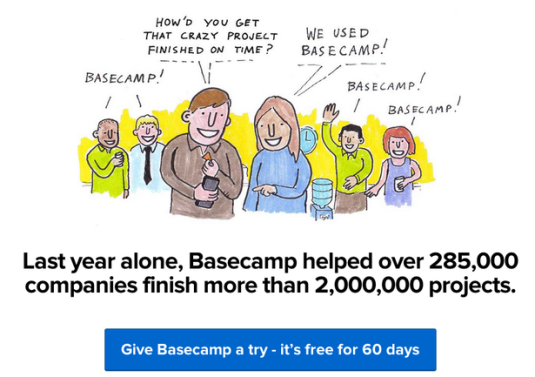
Basecamp leverages social proof by presenting statistics related to their past achievements in a manner that’s fun and has high recall value. This helps reassure the users of the business’s success rate.
Booking.com

Booking.com makes great use of social proof by providing website visitors with real-time quotes of the number of people reviewing information about a particular destination.
Principle Three: Liking
Other than preferring to opt for things that the general population seems to love, people also tend to choose products endorsed by people who are likeable and relatable.
Copywriting offers you the chance to let buyers know that running an online business does not necessarily mean that you are a cocky and unapproachable business magnate who never sleeps in on the weekend or spills coffee on his crisp, white shirt!
Build an image that is friendly, admirable and relatable. Comment on the latest happenings, share anecdotes or blog on interesting topics.
OneFineStay (About Us)
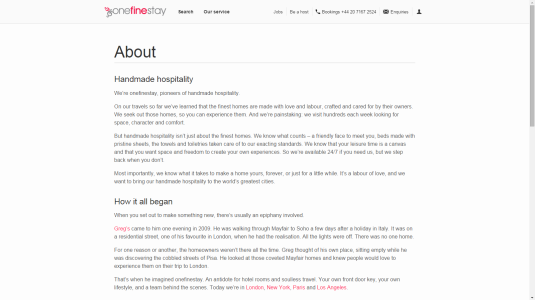
Onefinestay makes good use of evocative copywriting that is enjoyable to read. They convey their commitment to providing customers with a memorable experience through beautifully crafted prose.
Innocent
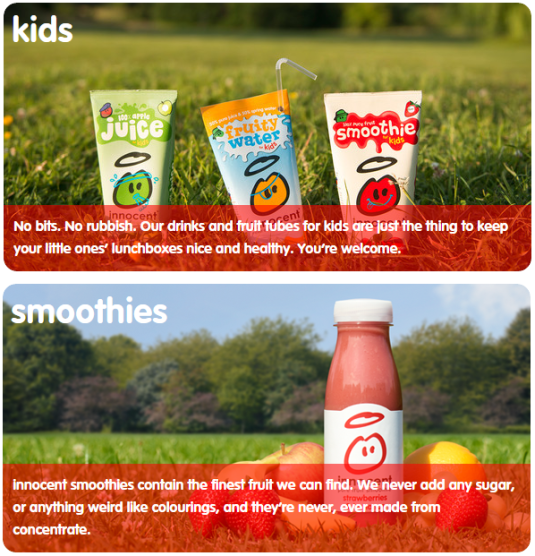
Innocent’s marketing copy is written simply and is friendly and witty. It portrays a likeable image in the mind of the reader.
Principle Four: Authority
Try this experiment out for yourself – Go up to people on the street dressed casually and ask them their opinion on an absurd, fictional piece of news. Once you have gotten over the sinking feeling of being repeatedly snubbed off, flip on your most impressive formal suit and repeat the process. The chances that people will actually take you seriously would be significantly higher.
Someone who ‘looks’ authoritative seems to invoke respect and makes people want to agree with them.
Now please note here that we aren’t asking you to feign authority just to get consumers to flock to your site. But you must remind them of why you deserve to be their top pick by being vocal about your skills and accolades. Sound off the proverbial trumpet every once in a while by publishing stories about your awesomeness.
There are several websites that create an instantaneous feeling of security and assurance in the visitor. Owing to their credibility, past performance and achievements, these websites do not have to work twice as hard to establish their authority. For example, if you consider sites such as Amazon, eBay or Etsy are reputable and hence, more convincing when they come up with new concepts and marketing copy.
The North Face

The North Face makes no qualms about stating the merits and success of their proprietary manufacturing techniques. Their marketing copy is authoritative and impactful.
Herbalife

Herbalife utilizes the principle of authority by citing an informative interview with a health professional on its homepage. This helps clarify any doubts the user might have about their products and helps add to the brand’s credibility.
Principle Five: Scarcity
When there’s less of something, the demand for it rises. Don’t let consumers feel that your product stock is like the dinner tables in Hogwarts’ Great Hall; immediately replenishing themselves when they run out.
Use language that rouses a sense of urgency in the reader. State clear deadlines on how long a new product will hang around in the market or the conditions under which a particular offer holds.
ModCloth
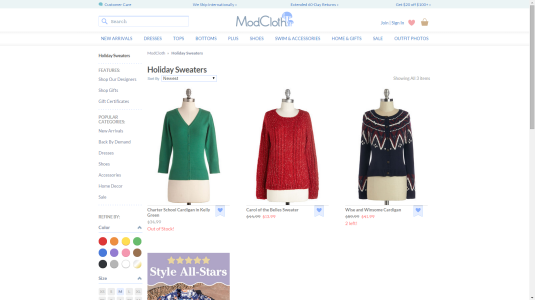
ModCloth has milked the principle of scarcity by creating a whole range of sweaters devoted to the holiday season. Citing them ‘Holiday Sweaters’, ModCloth creates a sense of urgency in the reader regarding the availability of the products.
Lilly Pulitzer

Here you can see Lilly Pulitzer using scarcity to persuade consumers to buy their products whilst they are on sale.
Principle Six: Commitment
People feel uneasy if they make a commitment and do not stick to it. Urge your website visitors to make voluntary, public commitments that may or may not be related to what it is that you are trying to sell.
Invite them to an exciting discussion on an interactive forum with regular e-mails asking them to confirm their participation. Write web copy that invokes in the reader a desire to commit to your ideologies, and, in turn, your products and services. This can help make them feel like they owe it to your website to stick by it, if only to stand up for their own beliefs.
Here’s a run-down of our personal favorite websites that utilize the tremendous power of words to engage the user in an experience that’s far, far beyond a buy-and-sell transaction…it’s an experience to be remembered.
J Peterman
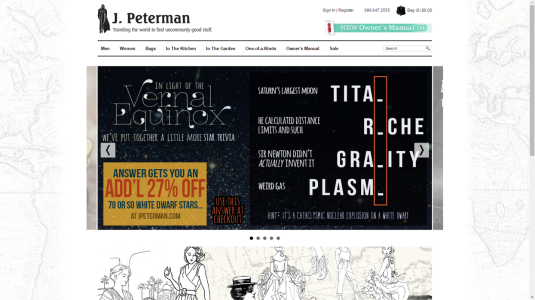
In this example of J.Peterman’s persuasive marketing techniques, they use a quiz to milk the principle of commitment. If the user puts in the effort to solve the quiz, they’d be more likely to go on to utilize the answer to avail of the offer made.
Kooshoo
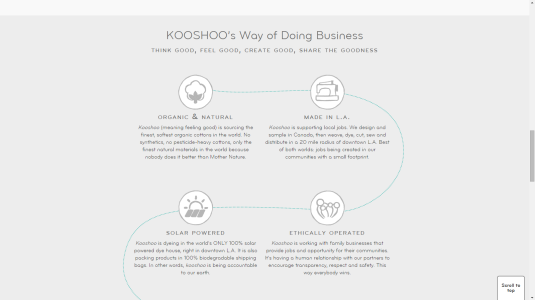
Kooshoo cites its organic manufacturing process as a core motivator behind buying its products. If the consumer’s beliefs resonate with theirs, the consumer would feel more inclined to buy Kooshoo’s products.
The scientific principles mentioned in this blog and exemplified by the sites above can help you write effective marketing copy that engages the readers and makes the user experience more wholesome and rewarding. Often, the nuances and subtleties of effective copywriting are missed out on when creating a website. Even though design is a prime motivator for driving consumer action, good marketing copy helps bolster the reach of your business. This is best understood by professional copywriters who are well-versed with the creative and scientific elements of writing an impactful copy.
Having a professional copywriter or two on board is sure to increase your chances of becoming a brand that’s worth its salt!

